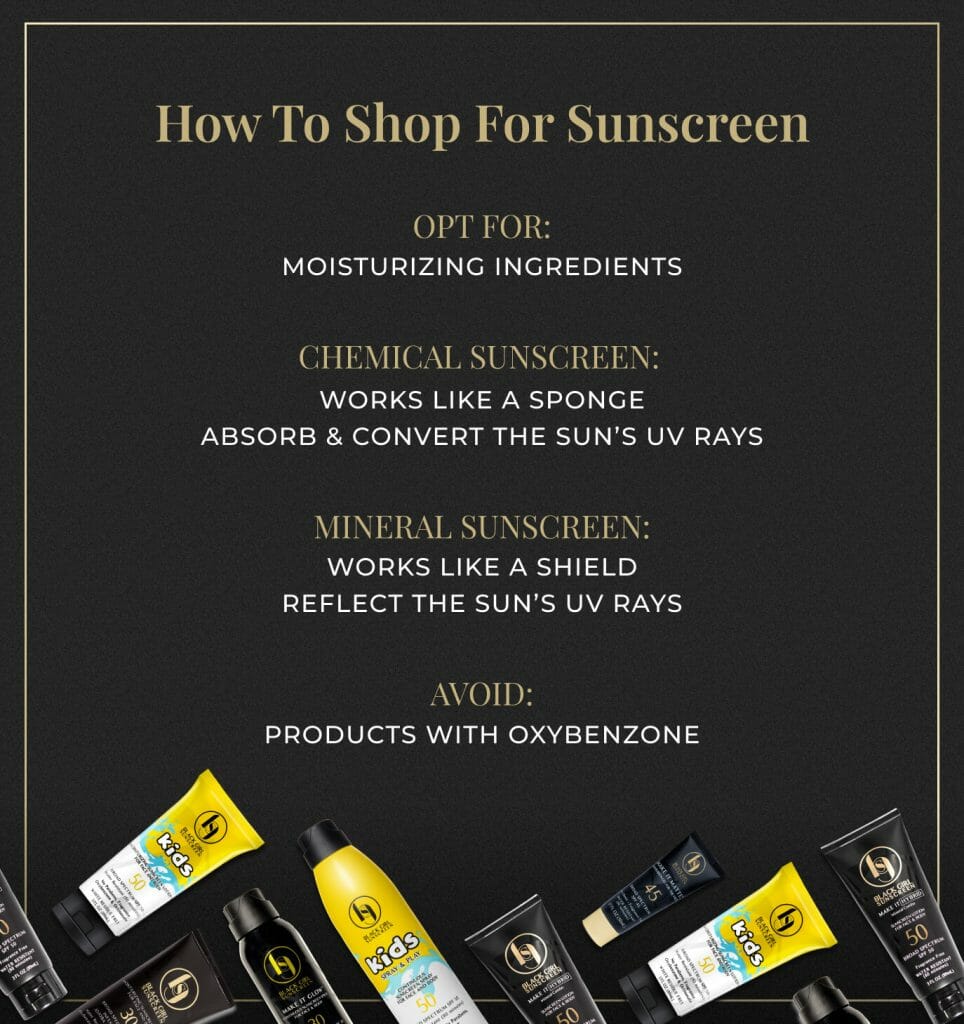Skincare is more than just a step in your beauty routine; it can help unlock your true confidence – and while there are various steps that you can take to enhance your skincare regimen, the daily application of sunscreen is one of the most crucial. This is because it protects your skin from the sun’s UVA and UVB rays, which could otherwise penetrate the skin, causing premature wrinkles (photoaging), melanoma, and other complications.
Black Girl Sunscreen has created SPF with moisturizing ingredients for truly radiant skin. Our formulas contain a range of ingredients that protect your skin from the glare of the sun, while simultaneously giving your skin a luminous glow.. Use this guide to find out more about all things sunscreen, including a deep dive into chemical sunscreen.
Why should you wear chemical sunscreen?
Chemical sunscreen, when applied correctly, prevents both sunburn and sun damage (also known as photoaging). This is necessary as, despite popular misconception, “Black people need to wear sunscreen as much as Caucasians do”. After all, while melanin does provide some additional UV protection, it does not provide as much protection as sunscreen.
There are many benefits associated with using chemical sunscreen. For example:
- Chemical sunscreen is easy to apply.
- Chemical sunscreen comes in many different forms to suit your preference, such as sprays or lotions.
- Chemical sunscreen does not leave a white or ‘chalky’ cast, which is common with mineral sunscreen.
- Chemical sunscreen starts to work between 15-30 minutes after application, protecting your skin from both UVA and UVB rays for up to two hours. It’s recommended that you always apply your chemical sunscreen 30 minutes prior to going outside and reapplying every two hours to receive the full benefit.
- Chemical sunscreen is water resistant.
However, with hundreds of different products on the market, it’s important that you do some research to figure out which type of sunscreen is best for you.
Chemical Vs Mineral Sunscreen
There are two main types of sunscreen on the market, chemical sunscreen and mineral sunscreen. While designed for the same purpose, they function slightly differently. For example:
- Chemical sunscreen features ingredients that kickstart a chemical reaction in your body which will absorb and release heat from ultraviolet rays, as opposed to allowing it to damage your skin.
- Mineral sunscreen features ingredients that will form a protective layer on the skin, therefore limiting or preventing UV damage.
- Hybrid sunscreen is a unique blend of mineral and chemical ingredients for the ultimate protection.
You can read more about the difference between these products here.
Are chemical sunscreens safe?
Both mineral and chemical sunscreen products are completely safe to use and you may find that you favor one product over the other depending on how you are spending your time outdoors.
However, there are many benefits to using chemical sunscreens. As mentioned above, chemical sunscreens offer UVA & UVB protection, giving you great peace of mind whenever you’re enjoying the sunshine. Furthemore, chemical sunscreens are water-resistant, which is perfect for those who are going to be swimming, spending time in water, or engaging in exercise, as you’ll still be protected.
However, while experts agree that chemical sunscreens are both safe and effective, you should avoid purchasing products that contain potentially harmful ingredients, such as oxybenzone or octinoxate.
Harmful Sunscreen Ingredients
You should always check out the ingredients listed on the product packaging before applying anything to your skin, especially if they contain potentially harmful ingredients. In sunscreen, we’d recommend that you look out for ingredients such as:
- Oxybenzone.
- Octinoxate.
As the above ingredients function similarly, their potential dangers are somewhat similar. Many dermatologists are now encouraging customers to steer clear of these ingredients as they can sometimes act as endocrine disruptors, meaning they are often linked with “disturbances in the immune and nervous system function”, alongside increased cancer risk. Furthermore, oxybenzone and octinoxate are not reef-friendly, due to the fact that they can cause coral bleaching.
What should I look for in my sunscreen?
Here are just some of the characteristics you should look out for when buying your next sunscreen.

Look for a Broad Spectrum Sunscreen.
This means that your chosen sunscreen is designed to protect you from both UVA and UVB rays, making it a particular comprehensive form of skin protection.
Look for Moisturizing Ingredients.
While in the sun, our skin loses a lot of moisture and hydration. This is because the heat dries out the natural oils in our skin. As a result, selecting a sunscreen that contains moisturizing ingredients is a great way to ensure your skin is both supple and protected. Furthemore, moisturizing ingredients, such as avocado, jojoba, cacao, and sunflower oil (found in our BGS Kids SPF 50 and BGS SPF 30 products), can soothe sunburn and provide inflammation relief.
SPF factor.
Every sunscreen label will inform you of the product’s SPF. This stands for ‘Sun Protection Factor’, which is a measure of how well it will protect your skin from sunburn or sun damage. The number tells you how long UV radiation would take to burn your skin, versus the amount of time it would take without having applied sunscreen. This means that when wearing an SPF 50 product, it theoretically should take you 50 times longer to burn than if you weren’t wearing sunscreen.
According to numerous scientific studies, users of all skin colors require an SPF of at least 30 in order to receive enough protection against UVB & UVA rays.
Whether you’re looking for a product that you can apply over your make-up before heading out for work or something to add to your beach bag – we’ve got you covered with our high-quality chemical sunscreens. Our products are packed with the benefits of chemical sunscreen, while also being free from any harmful chemicals and ingredients. To put it simply, Black Girl Sunscreen will provide you with the high level of protection you need to reduce sunburn and photoaging, while also helping you to maintain your natural, healthy glow.

